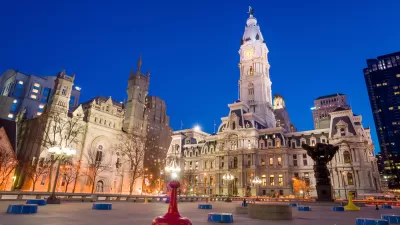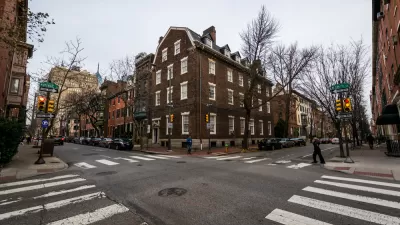The legislative quid pro quo is being used by members of the city council for the wrong reasons, leaving neighborhoods throughout the city in limbo.

Inga Saffron writes about the history and impacts of Philadelphia’s councilmanic prerogative, a practice that gives individual district councilmembers an inordinate amount of decision-making power:
Although the name sounds genteel and mannerly, the maneuver can turn an ordinary, mild-mannered district councilperson into power-mad feudal lord. No matter what craziness a local representative proposes, the rest of Council will vote in lockstep, no questions asked, knowing the favor will be returned when they want approval for a special measure in their own district. Usually the special bills involve property sales and zoning.
The Home Rule Charter in Philadelphia supports the prerogative, says Saffron, because it gives the city council final say on land sales and zoning changes and limits the authority of the planning commission.
Councilmembers have halted, thwarted, or left in limbo project after project through use of the prerogative, also known as "legislative courtesy," in their political wheeling and dealing. When projects do not move forward, the result is lingering blight, destruction of neighborhoods, and compromised public safety, says Saffron.
The prerogative violates the basic role of the legislature as part of a system of checks and balances, argues Saffron. She wants to see it eliminated, but she is not confident this will ever happen. "If Philadelphia ever hopes to realize its potential as a modern city, it’s going to need a constitution fit for the 21st century anyway. One where councilmanic prerogative doesn’t have the final word on the look of the city."
FULL STORY: How an obscure City Council rule leaves a trail of blight in Philadelphia

Alabama: Trump Terminates Settlements for Black Communities Harmed By Raw Sewage
Trump deemed the landmark civil rights agreement “illegal DEI and environmental justice policy.”

Planetizen Federal Action Tracker
A weekly monitor of how Trump’s orders and actions are impacting planners and planning in America.

Why Should We Subsidize Public Transportation?
Many public transit agencies face financial stress due to rising costs, declining fare revenue, and declining subsidies. Transit advocates must provide a strong business case for increasing public transit funding.

Understanding Road Diets
An explainer from Momentum highlights the advantages of reducing vehicle lanes in favor of more bike, transit, and pedestrian infrastructure.

New California Law Regulates Warehouse Pollution
A new law tightens building and emissions regulations for large distribution warehouses to mitigate air pollution and traffic in surrounding communities.

Phoenix Announces Opening Date for Light Rail Extension
The South Central extension will connect South Phoenix to downtown and other major hubs starting on June 7.
Urban Design for Planners 1: Software Tools
This six-course series explores essential urban design concepts using open source software and equips planners with the tools they need to participate fully in the urban design process.
Planning for Universal Design
Learn the tools for implementing Universal Design in planning regulations.
Caltrans
Smith Gee Studio
Institute for Housing and Urban Development Studies (IHS)
City of Grandview
Harvard GSD Executive Education
Toledo-Lucas County Plan Commissions
Salt Lake City
NYU Wagner Graduate School of Public Service




























